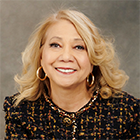Mildred García, chancellor of the California State University, has won the 2025 TIAA Institute Theodore M. Hesburgh Award for Leadership Excellence in Higher Education. An independent panel of judges selected her in recognition of her visionary leadership and success in promoting upward mobility for California students.
Mildred García began her tenure as the California State University’s 11th chancellor on October 1, 2023, becoming the first Latina in the nation to run a four-year public higher education system. As chancellor, she has worked tirelessly to build partnerships across higher education sectors, expand access and success for first-generation college students, drive California’s economic prosperity, and make the CSU system a national model for educational excellence.
Before taking on her current role, Chancellor García served as president and CEO of the American Association of State Colleges and Universities (AASCU), where she was a strong and internationally renowned advocate for the association’s 350 member institutions. At AASCU, she influenced federal policy on higher education and directed a strategic agenda focused on public college and university leadership for the 21st century.
The Hesburgh Award is named in honor of the Rev. Theodore M. Hesburgh, C.S.C., past president of the University of Notre Dame and longtime member of the TIAA and CREF Boards of Overseers. A world-renowned educator and humanitarian, Father Hesburgh (1917-2015) was a lifelong champion of human rights, the cause of peace, and care for the poor.
